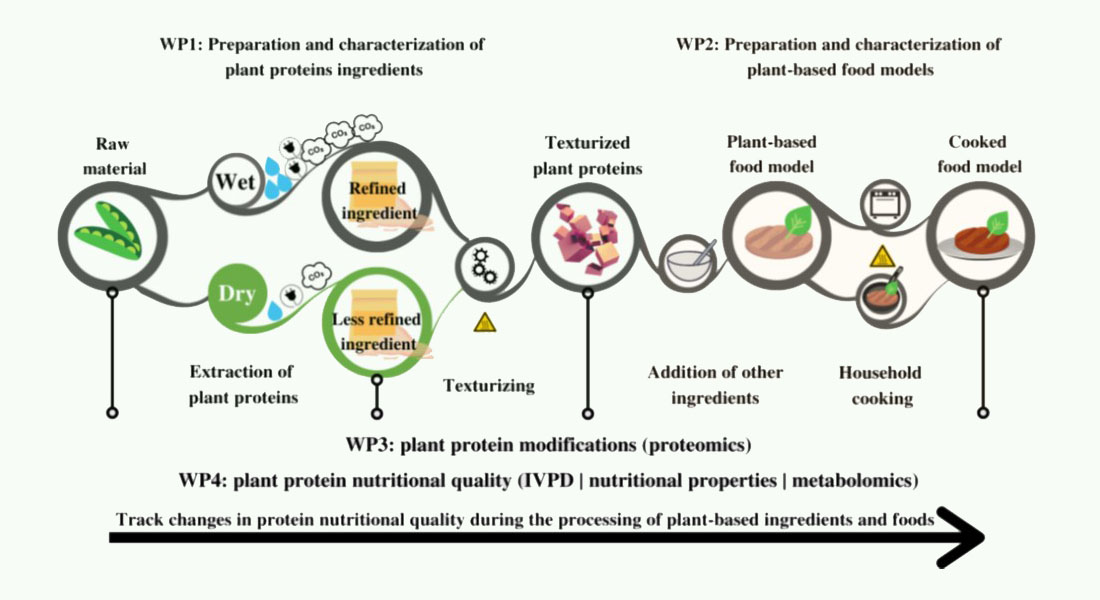Beyond sustainability: a holistic approach to evaluate the nutritional quality of plant protein-based foods

A more plant-based diet is part of the solution for a green transition for our planet, with plant-based foods as the main drivers to decrease animal protein consumption. However, plant proteins are less digestible and do not provide the right balance of essential amino acids required for human metabolism. This project will help define optimal processing levels to meet high nutritional quality and sustainability for plant-based foods, which will pave the way towards an efficient green transition.
Plant proteins are less digestible than animal proteins. Processing is crucial to improve their protein digestibility, but the intensive processing required to make current plant-based foods is not sustainable, due to high water and energy consumption. Concomitantly, it can result in protein modifications that can hamper protein digestibility.
Hence, there is a lack of understanding about the effect of different processes on those modifications and protein digestibility, especially considering the interactions between food components. Here, less refined versus highly refined plant proteins are compared and our approach using proteomics and metabolomics will enable monitoring protein modifications and metabolites formation upon digestion.
The BEYOND project aims to determine how different processes during the production of plant-based foods affect nutritional protein quality by using a holistic approach that integrates protein modifications and in vitro protein digestibility.
A successful green transition depends on changes in key systems that directly impact the climate, such as the food supply chain and the diet. According to the National Danish Council on Climate Change, the transition towards a more plant-based food production system is necessary to achieve the national climate target, which can contribute to reducing national greenhouse gas emissions from 51.3 Mt CO2-eq in 2018 to 21.8 Mt CO2-eq in 2030.
To achieve sustainable food production the degree of refinement combined with less use of energy and water is required, but there is still a lack of detailed understanding of the effect of these processes on the nutritional quality of food. We need to be able to understand if less refinement of plant proteins results in highly nutritious food.
The insights from this project will contribute to defining optimal processing levels to meet high nutritional quality and sustainability, aiming for an efficient and healthy green transition.
The project is divided into 4 interconnected work packages:
WP1. Preparation and characterization of plant protein ingredients
Aim: Preparation and characterization of all plant protein ingredients' chemical composition, thermal stability by differential scanning calorimetry, and protein solubility.
WP2. Preparation and characterization of plant-based food models
Aim: Preparation and characterization of food models' chemical composition and protein solubility.
WP3. Plant protein modifications
Aim: Identification of protein modifications after different processes (fractionation, HTSC, and cooking) on food models.
WP4. Plant protein nutritional quality
Aim: To determine the effect of food matrix and protein modifications on overall protein nutritional quality.
-
Wageningen University & Research (NL)
-
Federal University of Rio de Janeiro (BR)
-
Brazilian Agricultural Research Corporation (BR)
-
SiccaDania
UCPH Researchers:
| Name | Title | Phone | |
|---|---|---|---|
| Search in Name | Search in Title | Search in Phone | |
| Iben Lykke Petersen | Associate Professor | +4535321326 | |
| Patricia Duque Estrada | Assistant Professor | +4535325638 | |
| Rene Lametsch | Associate Professor | +4535333483 |
Funded by:
Beyond sustainability has received its funding from Independent Research Fund Denmark.
Period: January 1st, 2022 - August 31st, 2024

